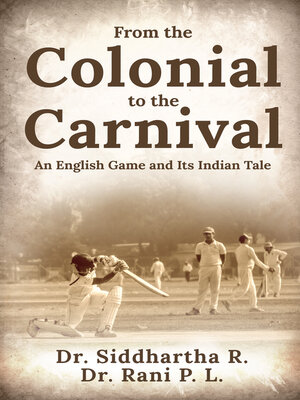
Sign up to save your library
With an OverDrive account, you can save your favorite libraries for at-a-glance information about availability. Find out more about OverDrive accounts.
Find this title in Libby, the library reading app by OverDrive.



Search for a digital library with this title
Title found at these libraries:
| Library Name | Distance |
|---|---|
| Loading... |
Research in colonial studies has traditionally revolved around the historical, political and economic aspects of the colonial regime. The case is no different with the British Empire in India. The Empire was, however, built less by military force and more through cultural reinforcement. To this end, the British engaged many tools – religion, language and sport.
Among the three Cs of Victorian England that defined civilisation, Cricket stood on par with Christianity and the Classics. Beyond being a sport, cricket was the Englishman's representation of his 'English-ness' in the colonies and a tool used for colonisation – a scantily researched area. This book traces, through the colonial postulates of Edward Said and Homi K. Bhabha, the colonial path cricket took to its growth in the colony.
The game moved from the 'exclusivity' of the English to the 'mimicry' of the natives as a part of the informal modes of rule employed in a colonial framework. Once formal modes were employed in the Empire, phases of 'cultural reinforcement' by the colonists followed by 'patronage' by the natives took over the spread of the game. Historical narratives are filled with examples supporting each phase in the sport. The very same tool that was used to establish the native's 'effeminacy' was used, finally, to invert the hegemony. The book argues how decolonisation, in India's case, did not occur through 'rejection' of the colonial culture, but, paradoxically, through 'adaptation' and 'assimilation' in clear colonial terms. This discussion achieves recency and relevance through its exposition of the telling decolonising moves in cricket to 'subvert authority' through the IPL. Mikhail Bakhtin's theory of the carnival helps view the shift of cricket from the colonial to the carnival mode.







